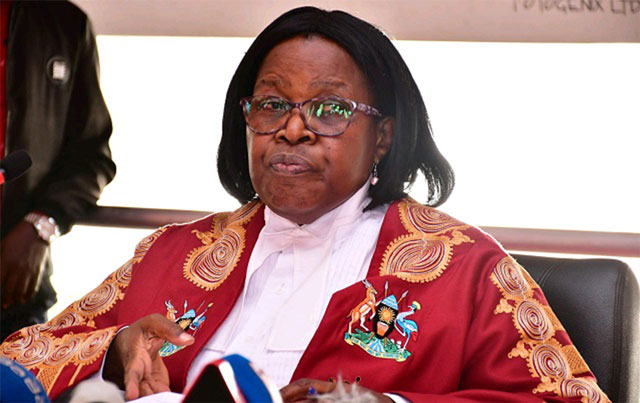
Kampala, Uganda | THE INDEPENDENT | Supreme Court Justice Dr Esther Kitimbo Kisaakye is currently living in exile, fearing for her life due to ongoing threats, according to documents obtained by Uganda Radio Network (URN).
The documents, including a series of emails, written by Washington-based law firm Covington & Burling LLP outline the situation in which Kisaakye is living. “Justice Kisaakye continued to live in fear for her life based on reports of threats she continued to receive,” reads one of the documents URN has seen.
It adds Kisakye fled the country out of fear for her life and now lives in exile. The acquired materials added that in July 2023, Kisaakye received a report of an imminent threat to her life from her lawyer, which they had received from a person who identified himself as a member of one of the Security Agencies in Uganda. The materials received, addressed to several organizations including the Centre for Human Rights, International Bar Association Human Rights Institute, International Commission of Jurists, Lawyers for Lawyers, and the Special Rapporteur on the Independence of Judges and Lawyers, reveal ongoing efforts to raise awareness about Kisaakye’s situation.
The law firm is mobilizing support and coordinating initiatives to bring attention to her plight as a judge in exile who is facing retaliation for fulfilling her judicial responsibilities, with her safety still at risk.
Kisaakye’s challenges date back to 2021 when she disagreed with eight justices over decisions related to the presidential election petition filed by former candidate Robert Kyagulanyi Ssentamu, also known as Bobi Wine challenging the election of President Yoweri Museveni for the sixth term. Kyagulanyi had sought the court’s permission to amend and also introduce new evidence to support his election petition.
However, the eight justices, led by Chief Justice Alfonse Owiny-Dollo, dismissed the application, citing the strict timelines for determining presidential election petitions, which, they argued, could not be amended. Justice Kisaakye accused the Chief Justice of attempting to suppress her constitutional right to deliver a minority judgment in which she disagreed with the rest of the panel.
She claimed her judgment was confiscated. Despite this, using a duplicate copy, Kisaakye delivered her minority judgment. With the lights and speakers switched off, she sat alone on the bench, as the eight other justices and the respondents’ lawyers had left the room. According to materials from Covington & Burling LLP, these events were followed by two and a half years of persecution, discrimination, and retaliation against Justice Kisaakye by the Chief Justice and other Supreme Court staff.
The retaliation took different forms which included; removing her as an administrative Judge, denying her any new work, removal of her research officer, denying of leave and medical benefits, and falsely accusing her of failure to write Judgments in appeals when she was not a member of the Coram or the designated Judge to originate the lead judgments.
In April 2021, the Uganda Judicial Service Commission initiated an inquiry into Justice Kisaakye’s conduct. Two months later, the Permanent Secretary of the Judiciary suspended her salary and benefits for two and a half months, citing ongoing covert investigations by the Commission.
By October 2022, after failing to resolve her issues through internal processes within the Uganda Judiciary and other relevant institutions, Justice Kisaakye filed a petition in the Constitutional Court. In her petition, she sought several declarations stating that the actions and omissions of five respondents—namely the Chief Justice of Uganda, the Permanent Secretary of the Judiciary, the Judicial Service Commission, the Attorney General, and the Chief Registrar and Commissioner of Human Resources, violated her rights under Uganda’s Constitution and undermined judicial independence.
Despite her petition, the Judicial Service Commission continued its work, and in February 2023, it issued a report recommending that the President of Uganda establish a tribunal to investigate whether Justice Kisaakye should be removed from office for alleged misconduct that occurred on March 18 and 19, 2021. As a lawyer, Kisaakye took action by filing another petition to quash the Commission’s report and to postpone the appointment of the tribunal until her initial petition was resolved. however, her case has never been granted any hearing dates.
In the set of documents received by URN, it is indicated that; “Unofficially, Justice Kisaakye received information that the Deputy Chief Justice, who will be retiring at the end of the year, is not willing to cause list her Petitions and applications, and that many Judges at the Constitutional Court were also not ready to hear her Petitions and applications either, because of the political sensitivities involved.” With more than seven years left on her term serving on the Supreme Court bench, Kisaakye sought to bring an early end to her career by informing the appointing authority, the President, of her decision in a letter dated July 18.
In her letter, she challenged the constitutionality of various administrative actions taken against her, including being investigated on allegations without the disclosure of specific offences, the freezing of her salary, and her removal as head of administration of the Supreme Court. Kisaakye’s resignation came five months after the Judicial Service Commission recommended her removal from office due to alleged misconduct and a verbal confrontation with Chief Justice Owiny-Dollo regarding the 2021 presidential election petition.
In response to her resignation and the letter from the Judicial Service Commission, President Museveni chose to reject her resignation. He stated that while he could not obstruct her wishes, her decision to resign would “preempt the work of the Judicial Commission of Inquiry or the Tribunal.” Kisaakye has also since filed another petition in the Supreme Court challenging the legality of the President’s decision to stop her from taking early retirement. She noted that despite the refusal to accept her retirement, she has not been given any work in the judiciary since. “Whereas my early retirement was unconstitutionally denied by the President, I have also been denied any judicial work at the Supreme Court and as a result, I have been kept in a state of being neither a serving Justice nor as a retired Justice of the Supreme Court,” Kisaakye’s affidavit in support of her application reads in part.
When contacted, Covington & Burling LLP, confirmed assisting Justice Kisaakye with her advocacy efforts in promoting the rule of law, good governance, and judicial independence in Uganda and beyond. “In 2022 and 2023, Justice Kisaakye filed two constitutional petitions with the Constitutional Court of Uganda seeking to protect judicial independence and halt the Judicial Service Commission’s unconstitutional inquiry. Thus far, the Constitutional Court has failed to follow its duties to hear constitutional cases expeditiously and in the order in which they have been received, as other cases filed after Justice Kisaakye’s have been adjudicated. We are aware that Justice Kisaakye has now filed a third constitutional petition seeking the Ugandan Government’s recognition of her retirement from the Supreme Court and the full payment of her retirement benefits,” an email signed by Amanda Reisinger from the law firm reads in part.
The spokesperson of the Judiciary Ereemye Mawanda didn’t respond to our messages and phone calls to his known telephone.
****
URN
 The Independent Uganda: You get the Truth we Pay the Price
The Independent Uganda: You get the Truth we Pay the Price



